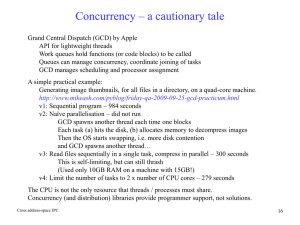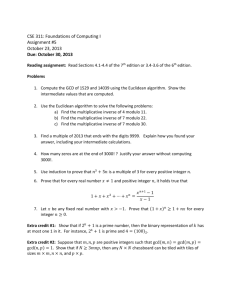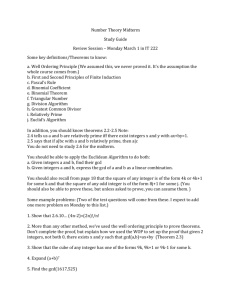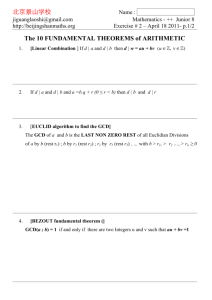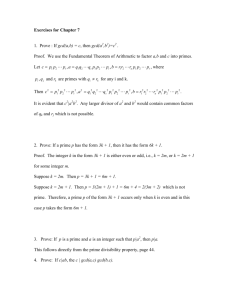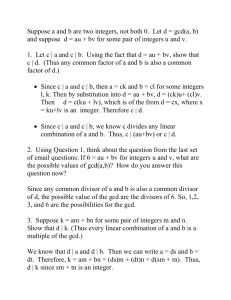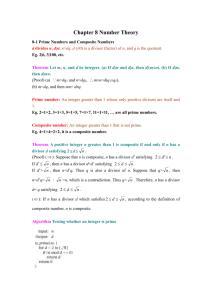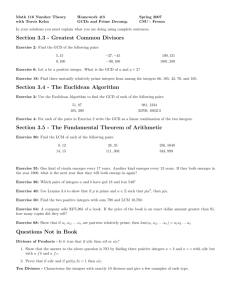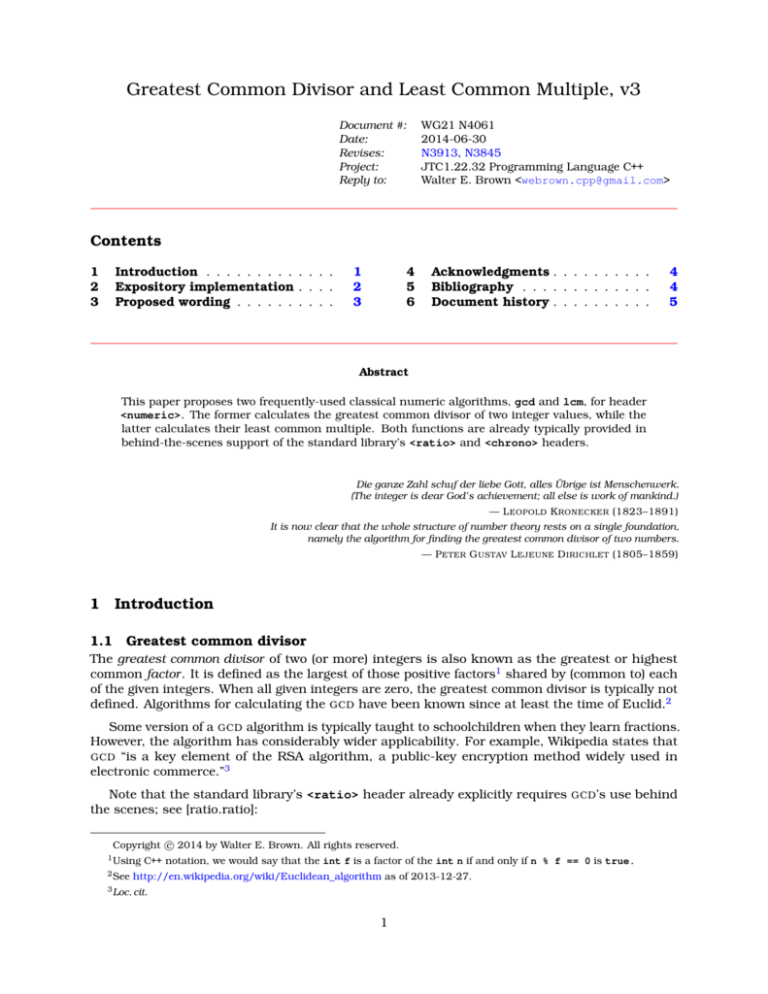
Greatest Common Divisor and Least Common Multiple, v3
WG21 N4061
2014-06-30
N3913, N3845
JTC1.22.32 Programming Language C++
Walter E. Brown <webrown.cpp@gmail.com>
Document #:
Date:
Revises:
Project:
Reply to:
Contents
1
2
3
Introduction . . . . . . . . . . . . .
Expository implementation . . . .
Proposed wording . . . . . . . . . .
1
2
3
4
5
6
Acknowledgments . . . . . . . . . .
Bibliography . . . . . . . . . . . . .
Document history . . . . . . . . . .
4
4
5
Abstract
This paper proposes two frequently-used classical numeric algorithms, gcd and lcm, for header
<numeric>. The former calculates the greatest common divisor of two integer values, while the
latter calculates their least common multiple. Both functions are already typically provided in
behind-the-scenes support of the standard library’s <ratio> and <chrono> headers.
Die ganze Zahl schuf der liebe Gott, alles Übrige ist Menschenwerk.
(The integer is dear God’s achievement; all else is work of mankind.)
— L EOPOLD K RONECKER (1823–1891)
It is now clear that the whole structure of number theory rests on a single foundation,
namely the algorithm for finding the greatest common divisor of two numbers.
— P ETER G USTAV L EJEUNE D IRICHLET (1805–1859)
1
Introduction
1.1
Greatest common divisor
The greatest common divisor of two (or more) integers is also known as the greatest or highest
common factor. It is defined as the largest of those positive factors1 shared by (common to) each
of the given integers. When all given integers are zero, the greatest common divisor is typically not
defined. Algorithms for calculating the GCD have been known since at least the time of Euclid.2
Some version of a GCD algorithm is typically taught to schoolchildren when they learn fractions.
However, the algorithm has considerably wider applicability. For example, Wikipedia states that
GCD “is a key element of the RSA algorithm, a public-key encryption method widely used in
electronic commerce.”3
Note that the standard library’s <ratio> header already explicitly requires GCD’s use behind
the scenes; see [ratio.ratio]:
c 2014 by Walter E. Brown. All rights reserved.
Copyright 1 Using
2 See
C++ notation, we would say that the int f is a factor of the int n if and only if n % f == 0 is true.
http://en.wikipedia.org/wiki/Euclidean_algorithm as of 2013-12-27.
3 Loc. cit.
1
2
N4061: Greatest Common Divisor and Least Common Multiple, v3
2 The static data members num and den shall have the following values, where gcd
represents the greatest common divisor of the absolute values of N and D:
— num shall have the value sign(N) * sign(D) * abs(N) / gcd.
— den shall have the value abs(D) / gcd.
Moreover, the SGI STL has for nearly two decades4 supplied and used a __gcd template in its
<stl_algo.h> header, treating it as a detail of its rotate algorithm implementation.
Because it has broader utility as well, we propose that a constexpr, two-argument5 gcd
function be added to the standard library. Since it is an integer-only algorithm, we initially
proposed that gcd become part of <cstdlib>, as that is where the integer abs functions currently
reside, but SG6 consensus favored <numeric>.
1.2
Least common multiple
The least common multiple of two (or more) integers is also known as the lowest or smallest
common multiple. It is defined as the smallest positive integer that has each of the given integers
as a factor. When manipulating fractions, the resulting value is often termed the least common
denominator.
Computationally, the LCM is closely allied to the GCD. Although its applicability may be not
quite as broad as is that of the latter, it is nonetheless already in behind-the-scenes use to support
the standard library’s <chrono> header; see [time.traits.specializations]:
1 . . . . [Note: This can be computed by forming a ratio of the greatest common divisor
of Period1::num and Period2::num and the least common multiple of Period1::
den and Period2::den. — end note]
We therefore propose that a constexpr, two-argument5 lcm function accompany gcd and likewise
become part of the same header, <numeric>.
2
Expository implementation
2.1
Exposition-only helpers
We use two helper templates in our sample code. Since <cstdlib> defines abs() for only int,
long, and long long argument types, we formulate our own absolute value function in order to
accommodate all integer types, including unsigned standard integer types as well as any signed
and unsigned extended integer types. Note that our function is annotated constexpr.
1
2
3
template< class T >
constexpr auto abs( T i ) -> enable_if_t< is_integral<T>{}(), T >
{ return i < T(0) ? -i : i; }
Second, we factor out the computation of the common_type of two integer types. This will allow
us, via SFINAE, to restrict our desired functions’ applicability to only integer types, as was done
for a single type in computing the return type in our abs template above:
4 At
least since Version 2.03, dated 1997-09-09, available from https://www.sgi.com/tech/stl/download.html.
5 Multiple-argument
versions can be obtained via judicious combination of std::accumulate and the proposed twoargument form. It may be useful to consider an overload taking an initializer_list, however.
N4061: Greatest Common Divisor and Least Common Multiple, v3
3
template< class M, class N = M >
using common_int_t = enable_if_t< is_integral<M>{}() and is_integral<N>{}()
, common_type_t<M,N>
>;
1
2
3
4
2.2
Greatest common divisor
We formulate our gcd function as a recursive one-liner so that it can qualify for constexpr
treatment under C++11 rules:
template< class M, class N >
constexpr common_int_t<M,N> gcd( M m, N n )
{ return n == 0 ? abs(m) : gcd(n, abs(m) % abs(n)); }
1
2
3
While this code exhibits a form of the classical Euclidean algorithm, other greatest common
divisor algorithms, exhibiting a variety of performance characteristics, have been published.6 As
of this writing, it is unclear whether any of these is suitable for use in the context of a constexpr
function. We have also been made aware7 of additional greatest common divisor-related research
that may lead to a future proposal for a more general algorithm in the standard library.
2.3
Least common multiple
We also formulate our lcm function as a one-liner so that it, too, can qualify for constexpr
treatment under C++11 rules:
template< class M, class N >
constexpr common_int_t<M,N> lcm( M m, N n )
{ return m == 0 or n == 0 ? 0 : (abs(m) / gcd(m,n)) * abs(n); }
1
2
3
Proposed wording8
3
3.1
Synopsis
Insert the following declarations into the synopsis in [numeric.ops.overview]:
namespace std {
...
template< class M, class N >
constexpr common_type_t<M,N> gcd(M m, N n);
template< class M, class N >
constexpr common_type_t<M,N> lcm(M m, N n);
}
6 E.g., [Web95, Sed97, Sed01, Web05]. See also these papers’ respective bibliographies for additional citations to
relevant literature.
7 Sean
8 All
Parent: Reflector message [c++std-lib-ext-695], citing [Ste99].
proposed additions and deletions are relative to the post-Chicago Working Draft [N3797]. Editorial notes are
displayed against a gray background.
4
3.2
N4061: Greatest Common Divisor and Least Common Multiple, v3
New text
Append the following new sections to the end of [numeric.ops]:
26.7.7 Greatest common divisor
[numeric.gcd]
template< class M, class N >
constexpr common_type_t<M,N> gcd(M m, N n);
1 Requires: |m| shall be representable as a value of type M and |n| shall be representable as a value
of type N. [Note: These requirements ensure, for example, that gcd(m, m) = |m| is representable as a
value of type M. — end note]
2 Remarks: If either M or N is not an integer type, the program is ill-formed.
3 Returns: zero when m and n are both zero. Otherwise, returns the greatest common divisor of
|m| and |n|,
4 Throws: Nothing.
26.7.8 Least common multiple
[numeric.lcm]
template< class M, class N >
constexpr common_type_t<M,N> lcm(M m, N n);
1 Requires: |m| shall be representable as a value of type M and |n| shall be representable as a
value of type N. The least common multiple of |m| and |n| shall be representable as a value of type
common_type_t<M,N>.
2 Remarks: If either M or N is not an integer type, the program is ill-formed.
3 Returns: zero when either m or n is zero. Otherwise, returns the least common multiple of |m|
and |n|.
4 Throws: Nothing.
3.3
Feature-testing macro
For the purposes of SG10, we recommend the macro name __cpp_lib_gcd_lcm.
4
Acknowledgments
Many thanks to the readers of early drafts of this paper for their thoughtful comments. Special
thanks to Cassio Neri for his extra-careful proofreading and helpful suggestions, and to Michael
Spertus for suggesting that algorithmic complexity be considered. Additional thanks to Cassio
Neri for representing the author during the 2014 Rapperswil meeting.
5
Bibliography
[N3797] Stefanus Du Toit: “Working Draft, Standard for Programming Language C++.” ISO/IEC JTC1/
SC22/WG21 document N3797 (post-Chicago mailing), 2013-10-13. http://www.open-std.org/
jtc1/sc22/wg21/docs/papers/2013/n3797.pdf.
[Sed01] Sidi Mohammed Sedjelmaci: “On a Parallel Lehmer-Euclid GCD Algorithm.” Proceedings of the
2001 International Symposium on Symbolic and Algebraic Computation (ISSAC ’01) (2001): 303–
308. 1-58113-417-7. http://lipn.univ-paris13.fr/~sedjelmaci/sedjelmaci.pdf.
[Sed97] Mohamed S. Sedjelmaci and Christian Lavault: “Improvements on the Accelerated Integer GCD
Algorithm.” Information Processing Letters 61.1 (1997): 31–36.
N4061: Greatest Common Divisor and Least Common Multiple, v3
5
[Ste99] Alexander Stepanov: “Greatest Common Measure: the Last 2500 Years.” Arthur Schoffstall Lecture
in Computer Science and Computer Engineering, Rensselaer Polytechnic Institute, 1999. http:
//www.stepanovpapers.com/gcd.pdf.
[Web05] Kenneth Weber, Vilmar Trevisan, and Luiz Felipe Martins: “A Modular Integer GCD Algorithm.”
Journal of Algorithms 54.2 (2005): 152–167.
[Web95] Kenneth Weber: “The Accelerated Integer GCD Algorithm.” ACM Transactions on Mathematical
Software 21.1 (1995): 111–122.
6
Document history
Version
Date
Changes
1
2
2014-01-01
2014-02-25
• Published as N3845 (pre-Issaquah).
• Restored missing abs( ) calls in algorithm implementations. • Excised comment re
standardizing our abs<> in future. • Required abs( ) result be representable in the
argument’s type. • Augmented the Acknowledgements. • Mentioned possible future
proposal for generalization. • Edited proposed wording per SG6 guidance at Issaquah.
• Published as N3913 (post-Issaquah).
3
2014-06-30
• Provided information re gcd in the SGI STL. • Augmented Bibliography of gcd algorithms. • Added to Acknowledgments. • Revised Proposed Wording per LEWG and
LWG guidance at Rapperswil. • Fixed typos and made other editorial improvements.
• Published as N4061 (post-Rapperswil).

